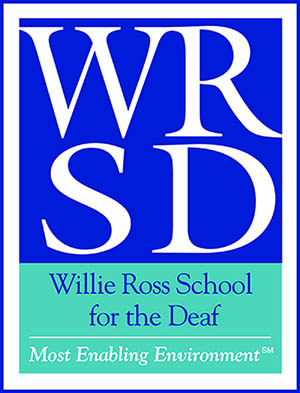Willie Ross School for the Deaf
School Description:
The focus of WRSD, since its founding by parents in 1967, is on providing quality programs and services to the deaf and hard of hearing students that it serves.
In the mid-1960s, a group of parents was united by the needs of their children who had been deafened by the rubella epidemic that swept the eastern United States. The parent group, led by the late Gene and Barbara Ross, shared the goal of ensuring that the best possible educational programs and services were available to their children.
At the time, residential placement of all deaf children was the prevailing option for families, leading the founding parents to establish their own day school. Their mission was to establish a school designed to meet their children's needs, ensuring their potential to become contributing members of society. As a result of their efforts, Willie Ross School for the Deaf opened its doors in 1967.
To honor the work of the Ross family, the parent group named the school after the Ross' son, Willie Ross, who now resides in southern California. The legacy of their vision and dedication to improving the lives of deaf children through education serves as the school's beacon to this day. A tenet of the founders' legacy is the recognition that instructional models must evolve along with the needs of the students they serve.
The commitment to recognizing the value of different approaches is demonstrated by the ongoing evolution of the Willie Ross model. Willie Ross School for the Deaf began as an oral-only school, but over time the limitations of this approach became clear. Rather than abandon the approach completely, sign language was integrated into the methodology, and Willie Ross School adopted a simultaneous communication approach. Over time, the school integrated new communication approaches and has employed technology to enhance students' access to the instructional model.
Advancements in the use of residual hearing through digital hearing aids, FM systems, and cochlear implants have been recognized and maximize learning and improve outcomes.
When studies showed the value of integrating deaf students with hearing students, the school offered the model of mainstreaming. Today, the school has a dual-campus model, which provides a center-based educational environment at its Longmeadow Campus as well as mainstreaming opportunities at its Partnership Campus within the East Longmeadow Public Schools.
Drawing on the belief that not all children with a hearing loss should be placed in a school for the deaf, the school established its Outreach Division to provide services from infancy through age twenty-two. Whether it is a toddler, identified through universal newborn screening and being served at home, or high school students receiving tutoring in their home schools, our services are there assisting them with their studies. The Outreach Division provides the support and specialization needed to ensure that the academic environment is responsive to the students' needs.
As the school looks forward, it works to employ the Most Enabling Environment for its students, where placement in an educational setting is based on an assessment of a student's individual strengths and challenges and the environment's capacity to facilitate accessible, quality learning experiences.
Student's/Disabilities Served:
We serve deaf and hard of hearing students from age 0 to 21
Services Provided:
We offer the following services:
- Full-time instruction in a school for the Deaf
- Fluent signing faculty and staff
- Speech and language
- Sign language instruction
- Counseling services
- Parent outreach
- Occupational and physical therapy
- Partnership with programming and support in mainstream settings
- Work-study
- Transition
- Diagnostic & Early Intervention services
- Audiological Services
- Hearing tests
- Hearing aid analysis and repair
- Impedance testing
- Earmold impressions
- Trial and fitting of new hearing aids
- FM auditory trainer management
- Cochlear implant management
- Outreach services
- Teacher of the Deaf services in a general education setting
- Audiological services
- Consultation services
- Community services
- ASL classes
Contact Information:
Robert W. Carter
32 Norway Street
Longmeadow, MA 01106
Ph. 413.567.0374
Email: bcarter@wrsdeaf.org
Website address: https://www.wrsdeaf.org
